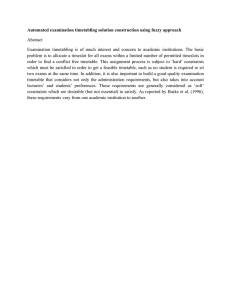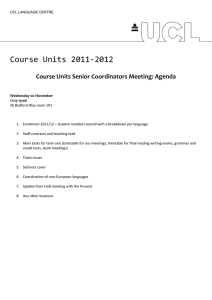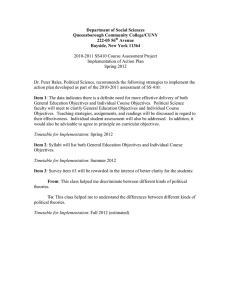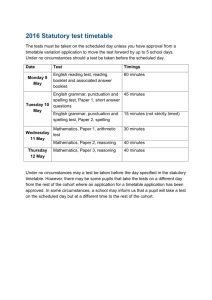Time Tabling Policy - Makerere University Policies
advertisement
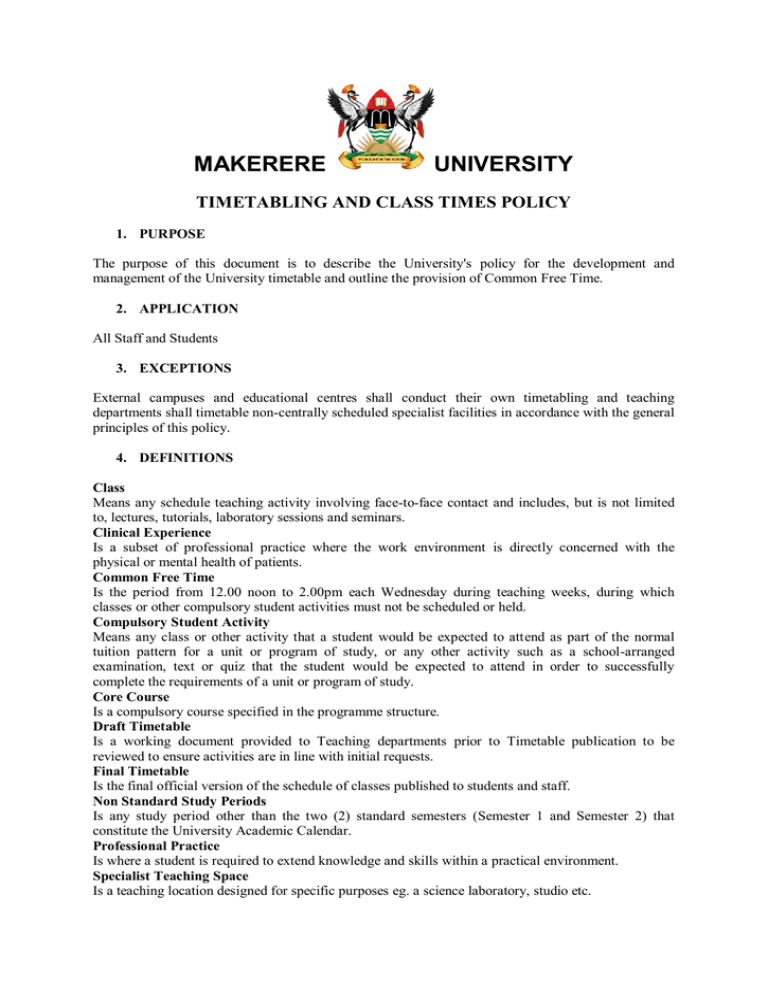
MAKERERE UNIVERSITY TIMETABLING AND CLASS TIMES POLICY 1. PURPOSE The purpose of this document is to describe the University's policy for the development and management of the University timetable and outline the provision of Common Free Time. 2. APPLICATION All Staff and Students 3. EXCEPTIONS External campuses and educational centres shall conduct their own timetabling and teaching departments shall timetable non-centrally scheduled specialist facilities in accordance with the general principles of this policy. 4. DEFINITIONS Class Means any schedule teaching activity involving face-to-face contact and includes, but is not limited to, lectures, tutorials, laboratory sessions and seminars. Clinical Experience Is a subset of professional practice where the work environment is directly concerned with the physical or mental health of patients. Common Free Time Is the period from 12.00 noon to 2.00pm each Wednesday during teaching weeks, during which classes or other compulsory student activities must not be scheduled or held. Compulsory Student Activity Means any class or other activity that a student would be expected to attend as part of the normal tuition pattern for a unit or program of study, or any other activity such as a school-arranged examination, text or quiz that the student would be expected to attend in order to successfully complete the requirements of a unit or program of study. Core Course Is a compulsory course specified in the programme structure. Draft Timetable Is a working document provided to Teaching departments prior to Timetable publication to be reviewed to ensure activities are in line with initial requests. Final Timetable Is the final official version of the schedule of classes published to students and staff. Non Standard Study Periods Is any study period other than the two (2) standard semesters (Semester 1 and Semester 2) that constitute the University Academic Calendar. Professional Practice Is where a student is required to extend knowledge and skills within a practical environment. Specialist Teaching Space Is a teaching location designed for specific purposes eg. a science laboratory, studio etc. Students and Staff with a Disability or Medical Condition Are those people who may require reasonable adjustments arising from a disability or equity consideration. Study Period Is a period of time in which a course is available, eg. Semester 1, Trimester 3, etc. Study Week Is the week before the commencement of the centrally scheduled examinations period during which students are expected to prepare for examinations or practical assessments. Teaching Weeks Are weeks within a study period during which classes are scheduled. Tuition Free Week Is a week within a study period during which classes and other complusory student activities are not scheduled, unless specifically approved in accordance with the Class Times Policy. Course Outline Is a summary of essential information relating to the course being studied and must be made available to students enrolled in the course prior to but no later than the date of the first scheduled class contact. 5. POLICY STATEMENT 5.1 Timetabling Principles In the development of the timetable, the University aims to recognise the needs and interests of all stakeholders. Therefore this policy is based on the following principles: 5.1.1 The timetable will be published in a timely manner allowing students to take account of the timetable when enrolling or changing their enrolment. 5.1.2 Changes to the final timetable will be kept to a minimum. 5.1.3 Class sizes will not exceed the capacity of the allocated venue. 5.1.4 Scheduling of classes will make efficient use of teaching space and resources. 5.1.5 Scheduling of classes and allocation of venues will endeavour to support the most effective teaching and learning practice. 5.1.6 As far as practical, students and staff are not required to be involved in more than four continuous hours of learning activities. 5.1.7 Authorised constraints will be taken into consideration regarding off campus teaching, cross-campus teaching, research, or fieldwork. 5.2 Timetabling Priorities In developing the timetable priority will be given to the following: 5.2.1 Courses taught across multiple programmes, 5.2.2 Large planned class sizes in descending order of planned class size, 5.2.3 Core courses will be timetabled where possible before elective units, 5.2.4 Activities of longer duration before those of shorter duration, 5.2.5 Activities with more teaching weeks before activities of fewer teaching weeks, and 5.2.6 Regular teaching activities before ad hoc activities and non-teaching activities. 5.3 Commencement and Duration of Classes 5.3.1 5.3.2 5.3.3 Core timetabling hours are Monday to Friday between the hours of 8am to 6pm. Classes may be scheduled in the evenings up until 9pm or on weekends where specifically requested by the relevant Principal and by mutual agreement by the teaching staff involved. Classes will normally start on the hour, however, in some circumstances may start on the half hour. 5.3.4 5.3.5 Where a class is formally shown as being of one hour's duration, in practice it shall be limited to 50 minutes in order to allow students time to get to the next class at the scheduled time. Where classes exceed a one hour period, there shall be a ten minute break for each one hour of contact. The timing of the break shall be decided by agreement between students and staff in the class. 5.4 Common Free Time 5.4.1 5.4.2 5.4.3 During teaching weeks, the period from 12 noon to 2pm each Wednesday is designated as Common Free Time and shall be kept free from all classes and other compulsory student activities to the maximum extent possible. Classes and other compulsory student activities may only be scheduled during Common Free Time in the following circumstances: where suitable venues or facilities for the class or other activity are not available or are difficult to schedule at other times and not using the Common Free Time period will disadvantage students; or where scheduling the class or other activity during Common Free Time is the most efficient or practical arrangement taking into account the scheduling of other compulsory student activities for the students affected on the day; or where scheduling the class or other activity during Common Free Time is required as a "one off" due to exceptional circumstances. Where compulsory student activities are scheduled during Common Free Time, the following restrictions should be observed to the maximum extent possible: scheduling of classes or other activities during Common Free Time for first year students should be avoided; scheduling of classes or other activities during Common Free Time that cover the whole two-hour period should be avoided. 5.5 Equity considerations 5.5.1 5.5.2 5.5.3 In accordance with the University's policies in relation to work, life and family, ethics, equity, social justice and diversity and various anti-discrimination laws, the University will ensure that the time-tabling process makes reasonable accommodation for staff and students. Students and staff requiring specialist timetable accommodation (ie related to disabilities, medical conditions, religious obligations, and/or family responsibilities) must request this in advance from the relevant Head of teaching department (or nominee) in the first instance and the University Counselling Service if the matter cannot be resolved. Such requests must be forwarded to the Availabilities and Timetabling Unit in advance of the timetable being developed. 5.6 Timetable Publication 5.6.1. The Final Timetable will be published as follows: Semester 1 timetable by 31 March of the current year; Semester 2 timetable by 31 October of the preceding year. 5.6.2 A draft timetable will be prepared for staff to review at least two weeks prior to the final timetable. Teaching departments will review the Draft Timetable to ensure that: Activity requirements have been adequately provided for all unit offerings, and are in line with initial teaching area's requests, All details of activities have been entered correctly, and Any clashes are reported to the Availabilities and Timetabling Unit. 5.6.3 Changes to the Final Timetable will be kept to a minimum and must be approved, in writing, by the Head of the teaching department (or nominee). Changes will only be considered if: student enrolment numbers exceed the capacity of the scheduled venue, or otherwise require a change, a unit is no longer deemed viable to run; an allocated venue does not provide the requested specialist facilities; staff availability necessitates a change; a location is a safety or health hazard; or there is a need to accommodate reasonable adjustments for students with a disability or medical condition. 5.6.4 Students shall be appropriately notified in a timely manner, of any changes to the Final Timetable by the Course Coordinator. 5.6.5 While the University attempts to accommodate student choices, the timetable may not allow for every student to attend their preferred combination of courses. Optional or elective units will not be guaranteed clash-free. 5.6.6 The Timetabling Coordinator will mediate any conflicts with the teaching departments concerned. 5.7 Compulsory Student Activities 5.7.1 5.7.2 5.7.3 5.7.4 5.7.5 Compulsory student activities, including classes or school-arranged examinations, shall not be scheduled during any Tuition Free Week or Study Week other than as prescribed in 5.7.2 below. Exceptions are permitted only in the following circumstances: In courses involving clinical experience or professional practice; where an enforced interruption would substantially reduce the value of the activity and/or; where the scheduling of such an activity during a class contact week would seriously disrupt other activities required of the students involved. In other cases, only where the following conditions are ALL met; exceptional circumstances exist making the scheduling of an activity during that period essential; consultation has occurred in advance with affected staff and students and a majority of students are in agreement; both the Head of School/Department and Principal support the proposal and are able to verify that appropriate consultation has occurred with students; and approval is obtained in advance from the Academic Registrar (or delegate). In order to obtain approval under 5.7.3 as an exception, requests will be submitted to the Academic Registrar at least four weeks prior to the date of the scheduled compulsory student activity. If compulsory student activities scheduled during any Tuition Free Week or Study Week are approved, this should be clearly communicated to students in the Course Outline. 5.8 Rescheduling of classes in an emergency Where a scheduled class must be cancelled due to an emergency, such as a power or lighting failure the University will endeavour to reschedule the class. The use of iLecture facilities should be considered or classes may be rescheduled to Common Free Time or Tuition Free Weeks. Where possible, the decision to reschedule or to not run the class will be made following consultation with the students affected. Such arrangements should not disadvantage students. 5.9 Rescheduling of classes where classes fall on a public holiday Where a scheduled class cannot run due to a public holiday that is a Mak holiday that falls within the prescribed academic calendar teaching weeks, the University may reschedule the class and the use of iLecture facilities should be considered. If the class is to be rescheduled, arrangements should be included in the Course Outline. 5.10 Determining Times for Clinical Experience/Internship 5.10.1 The Head of School/Department shall determine when clinical experience or internship is to be arranged and this should be clearly stated in the Course Outline. 5.10.2 Clinical experience/internship may be scheduled outside semester times in accordance with the availability of appropriate placement opportunities. 5.10.3 Clinical experience or internship should only be arranged during Tuition Free or Study Weeks in accordance with Section 5.7 above. 5.11 Service Teaching The service provider and the recipient department will liaise with each other before requesting timetable changes. Requests must be made by the service provider department. 5.12 Approval Authority This policy may only be amended with the approval of the University Council. Schedules to this policy may be amended by the University Senate and the updating of position titles, where there have been approved changes, may be amended by the University Secretary. 6. LIST OF SCHEDULES Schedule A - Timetabling Roles and Responsibilities RESPONSIBILITIES Policy Manager Deputy Vice-Chancellor (Academic Affairs)
